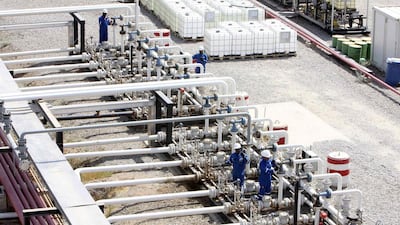The Kurdistan Regional Government (KRG) scored a legal victory in the US this week, clearing the way for oil exports there, but legal and political obstacles remain as the KRG tries to exert independence over its oil resources.
On Tuesday, a US district court in Houston, Texas, dissolved an order that had prohibited a tanker, United Kalavrvta, from offloading more than a million barrels of Kurdish oil, worth about US$100 million.
Since May, the KRG has been trying to sell oil independently against the objections of the Iraqi central government in Baghdad, as part of efforts to lay the foundations for full independence. It was helped by a deal with Turkey allowing trans-shipment of oil to the Turkish port of Ceyhan. The KRG hopes to hold a referendum on independence this year.
The Texas court effectively ruled that it did not have jurisdiction to block imports of the oil as the dispute is a constitutional matter that must be decided in Iraq.
The KRG welcomed the ruling. “This is now the second time that the federal oil ministry [MoO] has seen its efforts rejected by the courts,” it said yesterday. “The first time, in June of this year, the federal supreme court in Baghdad rejected MoO’s effort to suspend Kurdistan’s oil sales.”
The KRG minister of natural resources, Ashti Hawrami, also backed the ruling. “We are pleased with Tuesday’s events. The ruling of the Texas court should give confidence to buyers of Kurdistan crude oil in the US and elsewhere,” he said.
However, the dispute remains far from resolved as end buyers are still wary of KRG oil. Even though the KRG has sold four of the six tanker cargoes it has loaded at Ceyhan since last May, only one buyer has gone public – the Hungarian oil company MOL.
There were reports that other cargoes were bought for delivery in Israel, Egypt and Singapore, but the reluctance of buyers to be visible reflects the worry that Iraq’s central government has shown a willingness to pursue legal action to block sales, even amid violent turmoil at home. The larger oil companies want to avoid falling foul of Baghdad in case they are cut out of potentially lucrative contracts to develop Iraq’s vast oil resources.
Despite the Texas court decision, the US government has sent out confusing messages on the implications of buying oil from the KRG. A state department official, quoted by The Washington Post this month, pointed to possible problems. "If we hear of potential buyers, we alert them that buying this oil could expose them to serious legal risks and they should consult legal counsel about that."
But Brett McGurk, the deputy assistant secretary of state for near Eastern affairs, tweeted early this month that “there is no US ban on the transfer or sale of oil originating from any part of Iraq. Suggestions to the contrary [are] false”.
The politics behind the legal wrangling have been complicated by the escalating violence on the ground in Iraq and the advances of ISIL extremists, who have captured or disrupted operations in northern Iraq, including the area around the giant Kirkuk oilfield, over which the KRG and the Iraqi central government dispute sovereignty. The Kurdish fighting forces, the “peshmerga”, have been an important bullwark in efforts to push back the extremists and there has been talk in western capitals of supplying them with arms.
The violence in recent weeks has caused several international oil companies operating in the Kurdish region to pull out staff or curtail operations. This has affected companies including Genel and DNO, which operate Taq Taq and Tawke, respectively, the two fields that mainly feed the pipeline north to Turkey.
“There is a perception that the worst of the violence is over, that [Islamic State] is no longer on the offensive since US air strikes began,” an official at one of the companies operating in the Kurd region said yesterday. “I wouldn’t be surprised if companies begin quietly sending back employees that they withdrew if the situation remains stabilised.”
Meanwhile, the KRG has said the pipeline to Turkey is now able to export 300,000 barrels per day (bpd), while the head of operations at the Taq Taq field says the company plans to increase production to 140,000 bpd by the end of August, up from 100,000 bpd average throughout the year. Both Taq Taq and Tawke have ambitious plans to raise production further, if the security situation permits, to 200,000 bpd each by early next year.
But the jurisdiction over that oil will remain in dispute until Iraq’s security crisis and constitutional disputes are resolved.
amcauley@thenational.ae
Follow The National's Business section on Twitter

